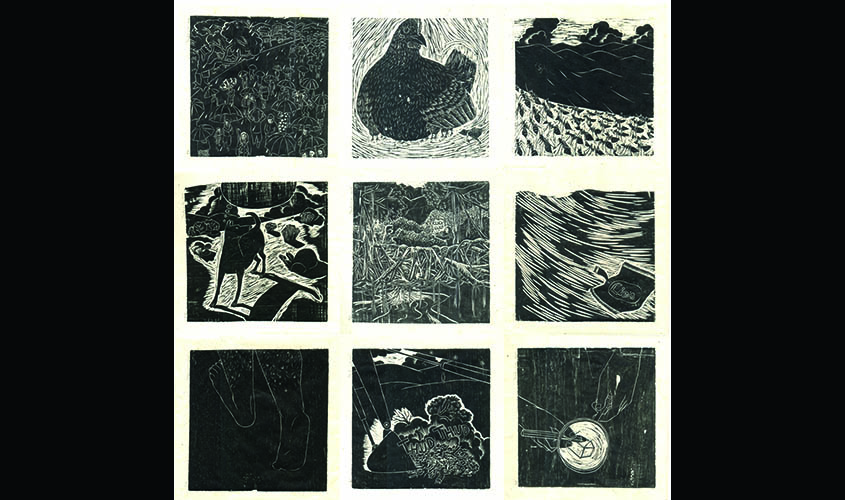A new exhibition in Delhi features a series of experimental works by artists from India’s Northeast. Entitled A-PART: Stories of Lands and Lines, the show is designed around social, political and aesthetic themes germane to that region, writes Sneha Gohri.
A-PART: Stories of Lands and Lines is a group show by artists from Assam, Arunachal Pradesh, Meghalaya, Mizoram, Sikkim and Tripura. It explores themes like home and exile, a sense of belonging and a sense of alienation. In these exhibits, we can see the artists grappling with questions of identity: Indian identity and where it overlaps with Northeastern identity. The show, organised by the Zero Gravity curatorial collective, opened at the Akar Prakar Contemporary Gallery in New Delhi on 23 July and is on view until 16 August.

One of the curators of the exhibition is Pranamita Borgohain, an independent art curator and writer based in Delhi who is also a part of the Zero Gravity collective. Speaking about the show’s title, Borgohain, says, “I have titled it so because it focuses on the Northeast and its borders. It is about lands and lines, and about how the Northeast is the only region that has borders with five other countries and how as a result the region goes through many problems relating to borders and restrictions of movement. So the exhibition has been conceived playing with those ideas.”
The other co-curator of the show is Vikash N. Kumar, who emphasises that the scope of the show goes beyond the regional limits. “Our agenda with this show is to make the themes go broader and to look at how countries like Burma and China affect the Northeast,” he says.
Artists have contributed works in different mediums and forms, ranging from painting and sculpture to installation art. Gopa Roy, a young artist who completed her post-graduation from the Visva Bharati University, Santiniketan in 2015, loves to capture the agricultural lay of the land, and often prepares her material herself. “I have made the paper in my creations myself using bamboo leaves and I have used sugarcane waste to create images, along with natural fibres and tree branches. I sometimes even use direct impressions which I take from the bark of trees. So every artwork of mine has a texture,” Roy says.

Another artist, Dharmendra, describes himself as someone who was born in between stories, discriminations, hierarchies, chaos and silence, full of winds and dusts, without any address. His works are inspired by, in his own words, “the notions of material culture, process of harvest, and how technology is disappearing spaces”.
His installation piece on display at the Delhi exhibition is called Land Escape (Outsiders Will Be Outsiders). It is made of wheat crop residue pasted on a wall in a way that appears like a two-tone landscape painting, suggesting some an Assamese harvest plain.
“The work itself is not an ending but a beginning, it will travel with me,” Dharmendra Prasad, who was born in Bihar but has lived most of his life in Assam. “This wheat crop residue is a very difficult material to work with but I have no choice. I was born with it.” In this particular installation piece, Prasad has placed a copy of Folk Tales of Assam and an old sketchbook of his, adding both a personal and a historical dimension to the work.
The exhibition features other artists like Treibor Mawlong, whose work Hills and Tales captures of the spirit of Meghalaya’s landscape on a black-and-white canvas; Victor Hazra, whose glass etchings and prints on fine-art paper provide a commentary on the changing nature of cities; and
Wahida Ahmed, who has used soil as the medium for her painting series, For the Love of My Land.
“This artwork involved the process of erasing, which is the metaphorical gesture for the slowly fading peace and harmony in the region due to the continuation of conflicts”, says Ahmed about her paintings exhibited here.
The exhibition is unique because it brings to light the contemporary currents in Northeastern art, as well as gives us a sense of what the thematic preoccupations are of those artists who have some personal links with that region. It is also rare for such a hard-hitting show to travel to Delhi. “Private galleries seldom entertain such proposals. The last show I curated in 2017, I was able to invite only two artists. But this gallery was kind enough to promote a conversation with a bigger audience and support the artists of the Northeast with this show on migration, identity and borders,” says Pranamita Borgohain.

